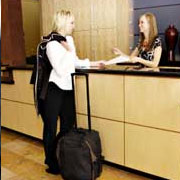SQA Advanced Certificate/Diploma Travel and Tourism

The SQA Advanced Certificate and SQA Advanced Diploma in Travel and Tourism are designed to equip learners with the knowledge, understanding and skills required for success in employment or progression to further academic and/or professional qualifications.
These qualifications cover the structure of the travel and tourism industry, marketing principles in travel and tourism, customer care, preparation for employment in travel and tourism, influences on the travel and tourism industry, marketing planning in travel and tourism, and sustainable development in tourism.
These qualifications are available through a growing number of colleges and universities around the world. Typically, an SQA Advanced Certificate takes one year to complete and an SQA Advanced Diploma takes two years.
Use the tabs below to open each section individually. Alternatively you can show all the sections.
Why deliver this qualification
SQA Advanced Certificates and Diplomas have been developed by SQA in partnership with colleges, universities and industry — so employers recognise that they provide sound evidence of ability.
The unit-based structure supports flexible delivery. A unit is typically 40 hours of timetabled learning.
There is a wide choice of optional units which will enable centres to offer courses tailored to meet local needs.
The SQA Advanced Certificate and Diploma provide progression routes to further study (see Progression).
Who does this qualification suit
The SQA Advanced Certificate and Diploma are suitable for a wide range of learners including:
- school leavers
- adult returners to education
- learners in employment who wish to enhance their career prospects
- leaners who wish to start their own business
Access
As with all SQA qualifications, entry is at the discretion of the centre. Examples of formal entry qualifications include:
- National Certificates in Travel and Tourism at SCQF levels 5 and 6
- an appropriate grouping of National Units
- any other relevant National Certificates at SCQF levels 5 or 6
- any two relevant National Courses at Higher together with three National 5 passes
- an SVQ at level 2 or 3 in a relevant area
- different combinations of relevant National Qualifications, vocational qualifications and equivalent qualifications from other awarding bodies may also be acceptable
- for learners whose first language is not English, a qualification in English for Speakers of other Languages (ESOL) at SCQF level 5 or a score of 5.5 in IELTS is recommended
- relevant work experience
Progression
Learners can progress from the SQA Advanced Certificate to the SQA Advanced Diploma in Travel and Tourism, and possibly to a related degree course. For further information please refer to SQA's progression partners.
Offer this qualification
Centres with devolved authority for approval should use their own internal approval process.
Centres without devolved authority must come forward for approval and should contact SQA's Business Development Team for guidance.
Assessors and verifiers must be able to meet SQA's general requirements for technical/occupational competence as outlined in the Systems and Qualification Approval Guide.
How to assess
Each unit specification gives detailed information on the evidence requirements and approaches to assessment for the unit.
Ongoing course assessment will apply.
Qualification structure
SQA Advanced Certificate in Travel and Tourism
Group award code: GM9G 47 (96 SCQF credit points)
SQA Advanced Diploma in Travel and Tourism
Group award code: GN12 48 (240 SCQF credit points)
For further information on the structures and units of these qualifications please refer to the arrangements document.
